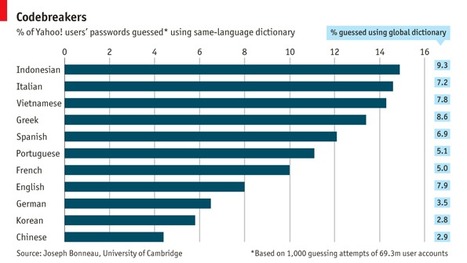In which languages are internet passwords easiest to crack?
DESPITE entreaties not to, many people choose rather predictable passwords to protect themselves online. "12345"; "password"; and the like are easy to remember but also easy for attackers to guess, especially with programs that automate the process using lists ("dictionaries") of common choices. Cambridge University computer scientist Joseph Bonneau has recently published an analysis of the passwords chosen by almost 70m (anonymised) Yahoo! users. One interesting result is shown below. The chart shows what percentage of accounts could be cracked after 1,000 attempts using such a dictionary. Amateur linguists can have fun speculating on why the Chinese do so well and the Indonesians do not. But one particularly interesting twist is how little difference using language-specific dictionaries makes. It is possible to crack roughly 4% of Chinese accounts using a Chinese dictionary; using a generic dictionary containing the most common terms from many languages, that figure drops only slightly, to 2.9%. Speakers of every language, it seems, have fairly similar preferences.
DESPITE entreaties not to, many people choose rather predictable passwords to protect themselves online. "12345"; "password"; and the like are easy to remember but also easy for attackers to guess, especially with programs that automate the process using lists ("dictionaries") of common choices. Cambridge University computer scientist Joseph Bonneau has recently published an analysis of the passwords chosen by almost 70m (anonymised) Yahoo! users. One interesting result is shown below. The chart shows what percentage of accounts could be cracked after 1,000 attempts using such a dictionary. Amateur linguists can have fun speculating on why the Chinese do so well and the Indonesians do not. But one particularly interesting twist is how little difference using language-specific dictionaries makes. It is possible to crack roughly 4% of Chinese accounts using a Chinese dictionary; using a generic dictionary containing the most common terms from many languages, that figure drops only slightly, to 2.9%. Speakers of every language, it seems, have fairly similar preferences.



 Your new post is loading...
Your new post is loading...







